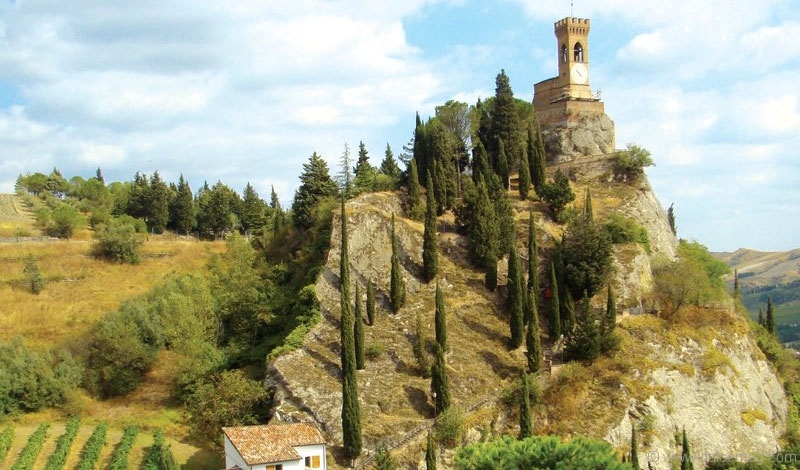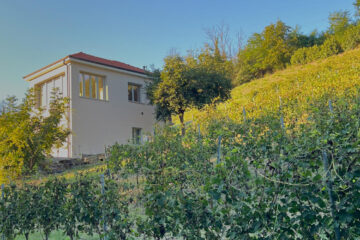Italy’s Black Gold
Some of the finest foods Italy produces hail from its northeastern epicurean capital: Emilia-Romagna. For thousands of years, silt has cascaded from the Italian Alps and the Apennines into the soil where it is naturally saturated by the flooding of the Po River. Among many other delicacies – Prosciutto di Parma and Parmigiano cheese – the most recent product making waves across the Atlantic Ocean is balsamic vinegar. The rich, milk chocolate-coloured earth culled from Emilia-Romagna’s heartland of Italian farming contributes to the creation of some of the best grapes in the world, including Trebbiano, Ancellotta, Lambrusco, Sangiovese, Albana, Fortana and Montuni. The pure, unfermented juice of these grapes, which are referred to as “must,” are barrel-aged in a natural fermentation process before they become authentic balsamic vinegar. This is when the famous casks, called vaselli by the locals, come into the picture. They come in different sizes and are made of different kinds of wood, such as oak, chestnut, mulberry, cherry, ash and juniper – all of which give a particular aroma to the balsamic vinegar.
The entire process is a delicate one, whereby the casks are topped up after water evaporation by the addition of the vinegar coming from the cask next to it in a series from smallest to largest. The outcome of good balsamic vinegar also and above all else depends on the custom aspect that every balsamic vinegar producer is able to give the product. Continuous attention, which includes the location and position of the series of casks, temperature and seasonal variations, are among some of the variables. That is why the production of balsamic vinegar is considered a true and unique art, in which enthusiasm, love, imagination and devotion are essential in creating a truly prestigious product.
Sweet and syrupy balsamico lends itself beautifully to gourmet sauces, desserts, fruits and cheeses. It can also be sipped for the sheer pleasure of it. A little goes a long way. All it takes is half a teaspoon of barrel-aged vinegar to flavour a vinaigrette dressing that serves four. The market for balsamic vinegar ranges from about C$5 for commercial-grade balsamic concoctions to anywhere between C$100 – $400 for artisan-made balsamic vinegars.
Ricordano Dodi, president of Acetaia Dodi, an established name in the authentic balsamic vinegar industry, saw the price gap as not only a great business opportunity, but also a chance to realize his adolescent dream of offering quality that consumers can consistently afford. Dodi remembers the frustration he felt as a young man in Italy when he couldn’t afford a decent bottle of wine for he and his girlfriend to savour. “My dream was that if one day I would ever be so fortunate to have my own company, I would offer a quality, affordable product so that every man and woman can enjoy it,” says Dodi, who can still be caught with a pencil in his ear as opposed to a Bluetooth during business hours. What might have merely been an ephemeral dream for some became the all-consuming goal for Dodi 40 years later. Before he could offer his quality balsamic to the masses, however, he would need someone to help him distribute his product of passion.
A major part of Frank Di Biase’s occupation as president of Molisana Imports is discovering Italian treasures and sharing them with Canadians. As a boy, he experienced and developed an appreciation for Italy where many of his summers were spent with his father on plant tours. Di Biase recalls the quality work ethic that the owners of these Italian companies exuded. The young Di Biase looked up to them with the honour and respect of an enthusiastic young apprentice while absorbing their methods along the way. Those magical little moments in Italy have shaped Di Biase and Molisana Imports into what it is today. “At Molisana Imports, we’re always looking for the best natural products Italy has to offer. The Dodi brand attracted me for many reasons, most importantly because it is all-natural, like many of the products that I bring over,” says Di Biase. “It’s harder to market natural and more premium products, however, over time, the reward is an educated and loyal customer.” A dynamic company, Molisana Imports offers a full range of quality authentic food products from Italy.
Enter John Arena, former owner of Toronto’s Winston’s Restaurant. He met Dodi in 2004. He also happened to be a family friend of Di Biase. “I’ve known [Di Biase] ever since he was a child,” says Arena. “His father and I were friends from our days in Italy … I could not think of a better product to represent the region of Emilia-Romagna, Molisana Imports and balsamic vinegar itself.” He arranged for Dodi and Di Biase to meet at Cibus 2010, an annual food exhibition in the city of Parma, Italy. The introduction would eventually lead to Molisana Imports introducing Acetaia Dodi to Canada. The taste of this sweet and sublime syrup that lends itself much more than just to salad is now available and affordable at food stores across the country. Thanks to Arena and Di Biase, Dodi was able to realize his dream.
Acetaia Dodi has been a great addition to stores such as Pusateri’s Fine Foods in Toronto. “Acetaia Dodi balsamic has been very successful in our store,” says John Mastroianni, general manager of Pusateri’s. “With all the misconceptions between authentic and commercial-grade balsamic vinegar, Di Biase’s idea of selling balsamic is not about the sale itself but the fact that he wants to educate consumers on the differences between barrel-aged and commercial grade, and the best way to learn is to try Acetaia Dodi for yourself.” For centuries, affluent families living in Emilia-Romagna have kept their sweet artisan-made ambrosia a secret. Thanks to one man’s dream and Molisana Imports’s dedication to discovering Italy’s best foods and bringing them to Canada, we can enjoy this rare Italian delicacy.
www.acetaiadodi.it
www.molisana.com


























































































No Comment